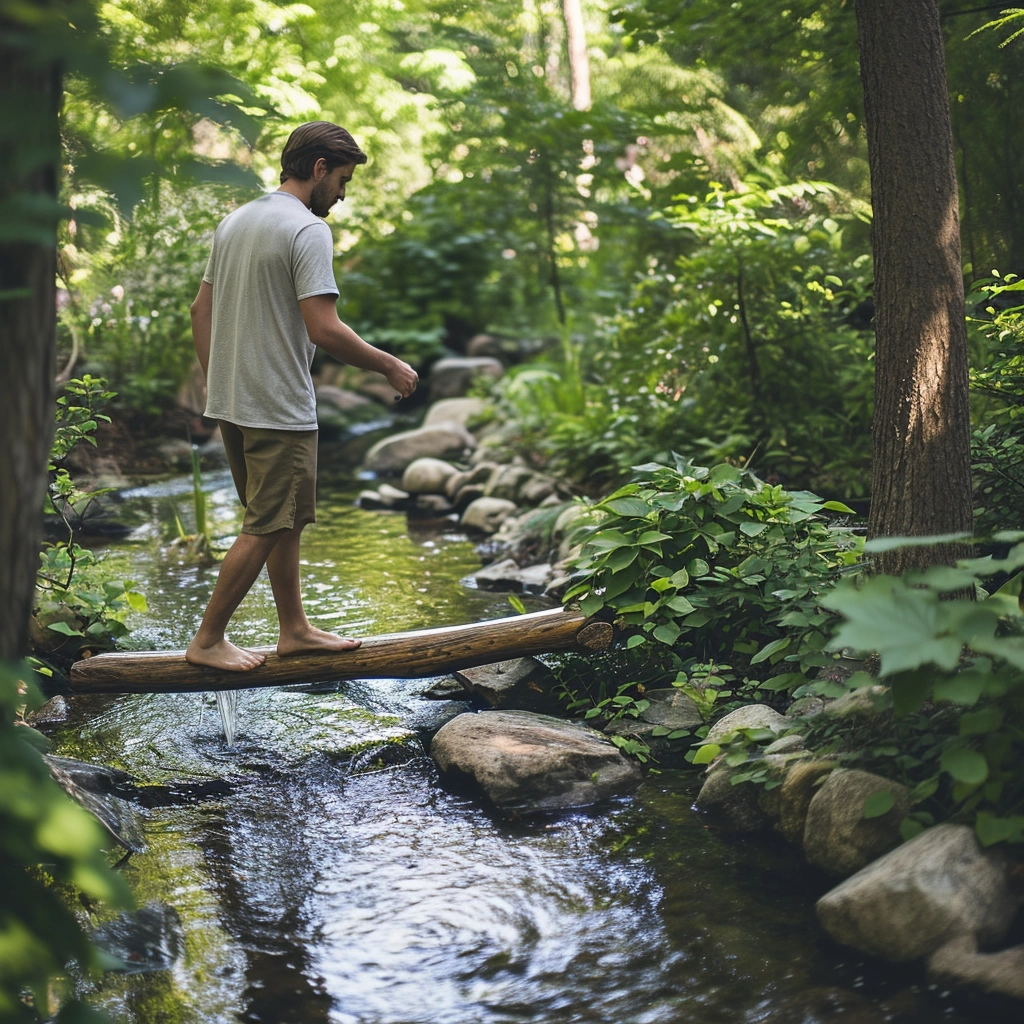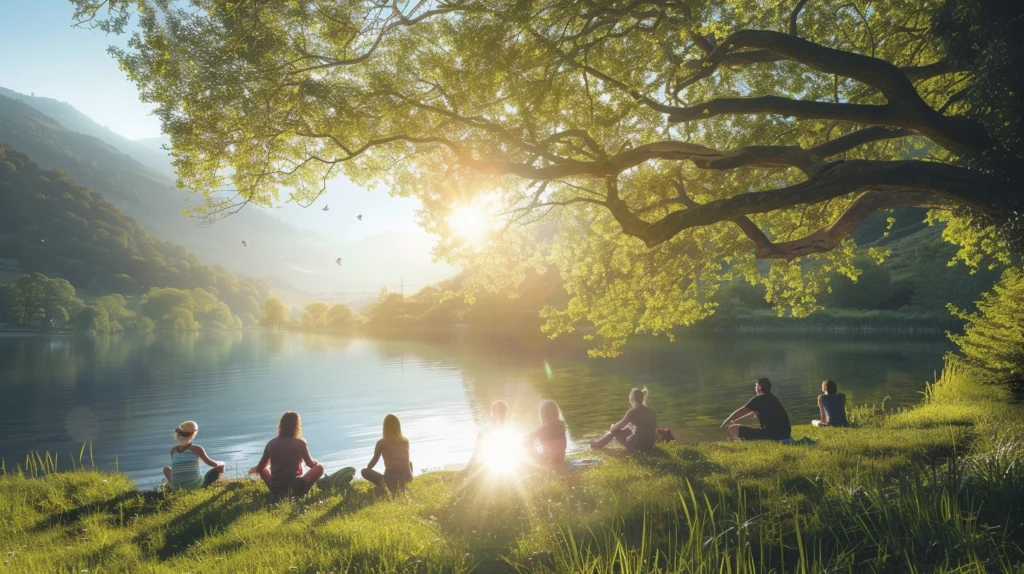So, people say things like this: “Go into nature.” An investigation in 2019 stated that one should spend two hours of recreational time in nature divided into intermittent days, each making an individual healthy and mentally strong.
With the cost of being human, why not accommodate those few seconds where one can go nature-tripping and benefit from every natural element?
Stress Reduction
There is a positive side to environmental interaction: opportunities that exist for sustained human physical and psychological well-being – from public park walks, which average and older city inhabitants undertake, to weekend getaways into the wilderness for illegal camping, as well as subsidized and regular hikes which are part of the programming interests of national park systems in the country and, indeed across the world. The benefits of being connected to nature are seen in many aspects of health, including reduced stress, increased focus, and improved mood. Research shows that it may reduce heart and blood pressure rates, increase breathing and circulation activities, and enhance work participation in athletes with a further reduction on one’s disease risk – all of which are central to healthy lifestyles and are beneficial in reducing one’s disease risk.
Investigating close to 20,000 participants in 2019, researchers found that those who spent at least two leisure hours a week for nature walks, picnics, or even basic jogs benefited more than those who didn’t, regardless of age, gender, chronic health conditions, etc. Additionally, effects were invariable dependent upon whether this amount of time was taken at one time or spread throughout several sessions – benefits were acquired regardless of duration and organization.
Not only can nature’s (benefits) be expressed by the fact that a person spends more time outside and does more physical activities, but mostly, they are based on mental and emotional health along with physical.
Outside time is precisely another recently researched practice; it allows contemplating and self-awareness, according to Wetter (University of Michigan). Findings showed that memory and concentration improved by 20% within an hour spent outdoors—researchers believe that people received these benefits from a simple perception of the beauties and sounds of nature.

Mood Enhancement
Sun on your face will boost your mood and health almost immediately; being outside has physical benefits such as lowered heart rate, better regulation of blood pressure, improved blood circulation, and prevention of chronic conditions such as diabetes and cardiovascular disease.
If researchers found that scenery can refresh an individual, simply looking at the natural environment can refresh one. A study that turned to measuring participants’ physiological and psychological responses was reported to have found that looking at natural plants led to increased cerebral blood flow in the frontal cortex, an indication of oxy-hemoglobin, concluding that looking at natural plants was associated with positive emotions.
In addition to that, outdoor activity makes it possible to have anxiety and rumination, which are some of the phenomena labeled to represent adverse mental health outcomes. An attempt that aimed to examine a group of wetland National Biosphere Reserves settled on the assertion that hanging out in these green spaces alleviates the signs of distress and sadness among the members.
Trying gardening or hiking with friends is an excellent idea for spicing up your outdoor time; a study published in Frontiers in Psychology journal showed people returning from four-day hikes scored much higher in creativity tests than those who didn’t embark on hiking in the first place at all. It may be as a result of walking outside and appreciating the scenery around that opens one’s mind to think creatively, which makes it easier for one to solve problems he is facing now or even in the future.
Cognitive Renewal
A person may be more creative when outside and can also develop mindfulness outside. The sounds from the perfumed trees, birds chirping, or when water glides over the rocks are all sources of natural stimulation that may contribute to your mind staying bright and balanced.
Moreover, animals can act as an outlet for creativity in the case of nature-deprived societies through gardening or painting, which can inspire outdoor activities such as hiking, bicycling, playing sports, or just resting.
Nature can give us a sense of vital power and concentration, and if we attempt to lessen the time spent on the screen, then nature can benefit our physiognomy. Data shows that being around green space leads to better sleep quality, mental health benefits, a lower rate of blood pressure decrease, and physical activity. In the report of Environmental Health Perspectives, people living near parks or other green areas are much healthier compared with those not having such access.
Studies indicate that exposure to green time can be drop at times, supporting healthy weight and reducing the risks for diabetes, heart disease, and cancer. Moreover, active spending time in nature prevents troubling mood disorders, such as depression, anxiety, or other mental illnesses – a parent can provide the surroundings of nature that give their little one’s chances to learn and learn the best basics that are necessary for normal development.

Physical Health Improvements
Contact with nature is a critical component of the good life and brings about wholeness in one’s well-being. This is demonstrated in research involving 20,000 people, as those who spent at least 2 hours’ outdoors per week (together or spread over many occasions) had noticed significantly healthier feelings and solid preference for wellbeing than those who didn’t.
Nature is that resource from which many aspects of our body can regenerate, such as our immune system, get us out of stress, stimulate creativity and concentration, provide better sleep, and even contribute to more profound relaxation. Although numerous studies use observational or epidemiological frameworks to investigate such an affiliation of nature to health, more recent quasi-experimental and randomized trials give better validity.
Research has shown that nature or the green view can supplement the ability to focus, which is quite a remarkable discovery about the impact and use of nature; for instance, in one study, participants who viewed images of forests displayed better concentration on an image of a difficult task for approximately 40 seconds longer than the participants who did not.
Those near natures often have decreased stress, better attention and mood, reduced depression risk, and shorter mortality advantage (s). In addition, aside from having superior physical activity and life expectancy, those who live close to nature generally have more substantial vital power. Even though most studies conducted in this research project mainly concentrated on parks or forests, the researchers are currently scrutinizing blue spaces. To sum up, the secret to achieving wellness by reaping the many advantages nature offers largely depends on how we regard the very essence of nature.

Connection and Harmony
Establishing a connection between ourselves and nature is not beneficial only from the point of view of mental and physical health, as it gives a feeling of unity and being a part of the environment one belongs to. Studies show that individuals with easy accessibility to natural places have a higher probability of staying and increasing their lives with favorable qualities than other personnel without such access. The biophilia hypothesis proposes that we are genetically designed to have fewer exercise opportunities but become highly dependent on nature to stay healthy, eat well, and fulfill our fitness goals in having more exercise opportunities to help reduce heart disease risk as well as natural settings to promote dietary habits.
To start, just 2 hours per week and any green space (whether a park or a natural environment) can contribute to improving both physical health and well-being. According to a study by the European Centre for Environment & Human Health, the participants who at least twice a week spent their time outside or combined their activities into one long day or a few days a week were far more likely to declare positive effects on the health and wellbeing than those with no experience of natural environments.
Green sustenance is essential to humanity- this benefit is especially pronounced among those segments of society who lack secured access due to social-economic considerations, e.g., women, youths, people with disabilities or health-related complications, and ethnic minorities. Without being nearby or not having the experience of green spaces as safe spaces, they may miss out on the proven health advantages of nature.
Conclusion
Being outdoors reduces stress levels, makes a person happier, and helps in remembering better, which is another thing we need to know about. However, one study also revealed that people who walked around nature for 90 min had reduced activity of smaller brain regions linked to thoughts of repetitive thinking – rumination.
As the final touch, nature gives us further benefits of feeling more bonded with each other and our surroundings. Research has revealed that green spaces in urban environments bring down crime rates and establish a homely attachment in the community; an inspection came across evidence reflecting that slightly more persons living in public housing units enjoying green space knew good numbers of neighbors with an additional prolonged feeling of community and mutual care across buildings not rife with greenery.
Research in this area reversed many benefits of nature for the minds and bodies, illuminated the characteristics of spending time outdoors for the wellbeing and needs is constantly moving ahead to find out how much exposure to nature is optimal and for which groups of people such an exposure will give maximal benefits. In the ideal case, longitudinal observational studies should also be applied, with the help of which it is possible to measure long-term effects and pay attention to lifecycle windows in which the effects of natural exposure can be potentially significant.
Different theories have investigated the concept of human appreciation of nature that is built into our biology. Humans have two known theories: Attention Restoration and Stress Restoration Theory. Notwithstanding the intricacy of the mechanism, it is clear that our ancestors evolved, possessing insignificant ties to nature that still resonate with well-being outcomes.

